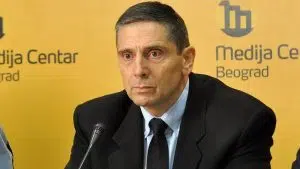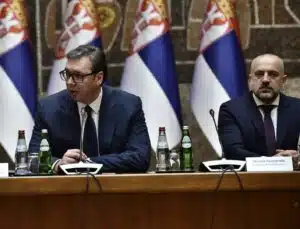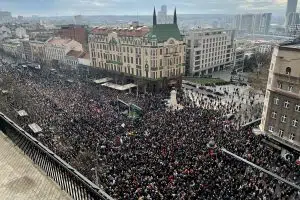Brussels – The scandal that threatens to engulf Serbia’s president, Aleksandar Vučić, reaches Brussels. “We are following this case closely and are in contact with the relevant authorities and interested parties, it is important to get full clarity on the facts,” is the comment made to Eunews by the EU Commission’s spokeswoman in charge of Neighborhood Policy and Enlargement, Ana Pisonero, regarding the violence suffered by the leader of the opposition Republican Party, Nikola Sandulović, who was picked up by the Serbian intelligence services last Wednesday (Jan. 3) and severely beaten while in detention. A torture that could leave him partially paralyzed.

“We expect the rights of all citizens to be respected,” the Commission spokeswoman made clear, stressing that from an EU candidate country Brussels expects that “any detention should be based on reasonable suspicion of having committed a crime and any credible allegations of violence should be followed up effectively by the competent authorities.” The reference is not only to what happened on January 3 but also to the causes of such violence. Two days earlier the leader of the Republican Party had announced on social media of having paid his respects at the grave of Adem Jashari, one of the founders of the Kosovo Liberation Army (Uçk) killed by the regime of Slobodan Milošević in 1998 along with 57 members of his family, including women and children. Sandulović asked the family for forgiveness, laid a wreath, and apologized on behalf of the country for war crimes committed in the recent past by the Serbian state.
The following day the family reported that members of the Serbian Security Information Agency (Bia) seized Sandulović and subjected him to severe physical attacks before taking him to the military hospital in Belgrade. On January 4, he was seized again and detained at the Belgrade Central Prison without access to independent medical care: the previous day doctors had found that he had fractured a rib and was reportedly paralyzed on one side of his body. Among the people responsible for Sandulović’s torture would also be Milan Radoičić, deputy head of Lista Srpska (the main party representing the Serb minority in Kosovo and closely controlled by President Vučić) who admitted to organizing the armed attack in northern Kosovo in late September last year. Last Saturday (Jan. 6) the Republican Party leader was sentenced to a 30-day detention for laying flowers on the grave of what Belgrade considers a war criminal, but his lawyers denounce the indictment as a violation of the European Convention on Human Rights.

From left: Serbia’s president, Aleksander Vučić, and the deputy head of Lista Srpska, Milan Radoičić, in Belgrade (July 6, 2022)
While neither Serbian President Vučić nor any other Serbian institution has publicly commented on the arrest and assault, the former head of Serbian intelligence (who resigned two months ago), Aleksandar Vulin, reported to the Serbian tabloid Novosti that he personally ordered Sandulović‘s arrest, “because he is suspected of undermining the constitutional order and actively working to support the secession of so-called Kosovo.” According to Vulin, the arrest warrant for Sandulović on his orders would remain valid despite his resignation, but he did not comment on the beating. The Serbian opposition politician’s lawyer, Čedomir Stojković, disputed the former intelligence chief’s words and pointed the finger at the president of the republic: “It is a concerted statement because Vulin’s political career in Serbia ended in agreement with Vučić and now he can falsely take responsibility for everything that causes international damage to the regime.”
Tensions in Serbia after early elections
Despite high expectations on the eve of the elections from the “Serbia Against Violence” coalition, the Serbian Progressive Party won again in early elections with 46.67 percent of the vote, trailing by 23 points the very united opposition that came in second place. In the face of fraud and numerous illegal actions at the ballot box, thousands of people took to the streets responding to the call of the parties and movements that had translated into political (pro-European) demands the street protests against the climate that led to the May shooting. The Organization for Security and Cooperation in Europe (OSCE)-led election observation mission—in which members of the European Parliament also participated—also noted “the misuse of public resources, the lack of separation between official functions and campaign activities, as well as intimidation and pressure on voters, including cases of vote-buying.” Nearly a month after the early elections, protests against fraud by the ruling party continue, particularly in Belgrade.

Serbian opposition street protests in Belgrade (credits: Miodrag Sovilj / Afp)
In the capital itself, the situation remains tense, and the possibility of a repeat of the local elections whose victory was claimed by the Serbian Progressive Party cannot be ruled out: the party led in Belgrade by the pro-Russian Aleksandar Šapić won 49 seats (out of 110), not enough to control the City Assembly with the support of the far-right russophile nationalist party “We, the Voice of the People” of Branimir Nestorović alone. The coalition “Serbia Against Violence” denounced that over 40 thousand people who arrived from Republika Srpska (the Serb-majority entity of Bosnia and Herzegovina) had voted in Belgrade without being formally registered as residents and demanded the annulment of the ballot result, explicitly speaking of “electoral theft.” The same complaint came from MEP and member of the parliamentary delegation Viola von Cramon-Taubadel (Greens/Ale): “We have seen cases of organized transportation of voters from Republika Srpska and intimidation of voters.”
Find more insights on the Balkan region in the newsletter BarBalcani hosted by Eunews
English version by the Translation Service of Withub





